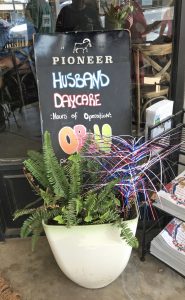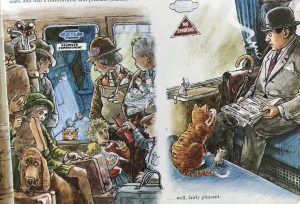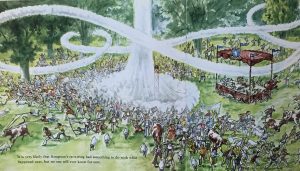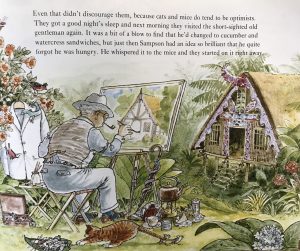So I was wandering though my YouTube subscription channels and noticed this one particular bit of restorage – a mid-century modern Moroccan brass coffee table on a wooden stand, which rather decayed object was being renovated and restored. And it reminded me very much of a similar table which served in my parent’s various houses for nearly four decades, until it was destroyed in the 2003 Paradise Mountain Fire in northern San Diego County. That fire pretty much obliterated Mom and Dad’s retirement house. All that was left standing was a quadrangle of conblock walls … everything else in the house burned to a crisp, unless it was a few things that Mom threw into the back of her car, or which the firemen grabbed when the fire began exploding the glass windows inwards. When all was said and done, the insurance claim paid off and the house rebuilt, I think Mom rather had fun replacing the furniture and contents to her own taste, rather than what had been a random collection of family hand-be-downs and stuff acquired because it was available and either inexpensive or free.
The Moroccan brass table that my parents had in their various living rooms looked more like this one on eBay: almost five feet across, engraved overall with an ornate deckle edge and a matching wood and brass “spider” stand, which folded flat. Mom usually had the current issues of her magazines arranged on it, with an antique globe-shaped bowl with blue irises on it in the center. When we were expecting guests, it was usually my chore to remove all the issues of Harpers, The Atlantic, American Heritage and whatever, to apply about a quart of brass polish and the equivalent amount of elbow grease and polish the darned thing, before replacing the array of magazines. But when Mom and Dad refurnished their house, the Moroccan brass coffee table wasn’t something they were fond enough of to replace. The one like it that I located on eBay is on offer for almost $900, nearly half again what it originally ought to have cost. The insurance would have paid for a replacement … if they had wanted one. And why did Mom and Dad give houseroom for so many years to an expensive, high maintenance but distinctly flashy bit of mid-century exotic modern? They didn’t pick it out or pay for it – it came as a gift from Great-Aunt Nan. And thereby hangs a bit of a family story.
I think Great-Aunt Nan worked a lot of different jobs in her lifetime – I am not entirely certain what some of them were; secretarial positions for certain, possibly up-scale retail sales, a telegraphist in the 1930s, a government job in WWII and an enlistment in the Women’s Auxiliary Army Corps. She might also have had income from what remained of the family fortunes established by her father, my Great-grandfather George. She lived very simply in small rental apartments, and traveled when the urge took her … anyway, one day in the mid-1960s, she was tootling around one of the high-end department stores in downtown Los Angeles. It may have been Bullocks, could have been May Co., or Robinsons. For some reason, Nan went wandering through the furniture department – and spied the Moroccan table and stand.
Holy cow! It was priced at $60, which even then was a steal! Obviously, someone marking the price tag on that table had made a howling blunder by misplacing a decimal point; it should have been marked $600! Well, never one to disdain a bargain, Nan insisted on buying the Moroccan brass table (and stand) for $60, over the strenuous objections of the salesperson, and the department head, and for all that I know, the store manager. No, (said Nan, standing her ground as only a spinster lady of independent means and irreproachable English upbringing could) – she knew the rights of retail sales. What the price on the sales floor was marked as – that was what it would sell for, and she would have that Moroccan brass table (and stand) for the $60 marked price, or else… I have no doubt that Nan would have raised the matter all the way to the Bullock’s company president and the board of directors.
Of course, Nan emerged triumphant, with the $60-dollar Moroccan brass table (and stand) in her possession – an item for which she had about as much use for as a goldfish does for long winter underwear. It was the principle of the thing, and too good a bargain to pass up. She gave it to Mom and Dad, who also appreciated bargains, even if it wasn’t for an item which they liked particularly well. Free was an even better deal than $60.
And that is the tale of the inadvertently marked-down Moroccan brass coffee table (and stand.) You’re welcome.














Recent Comments